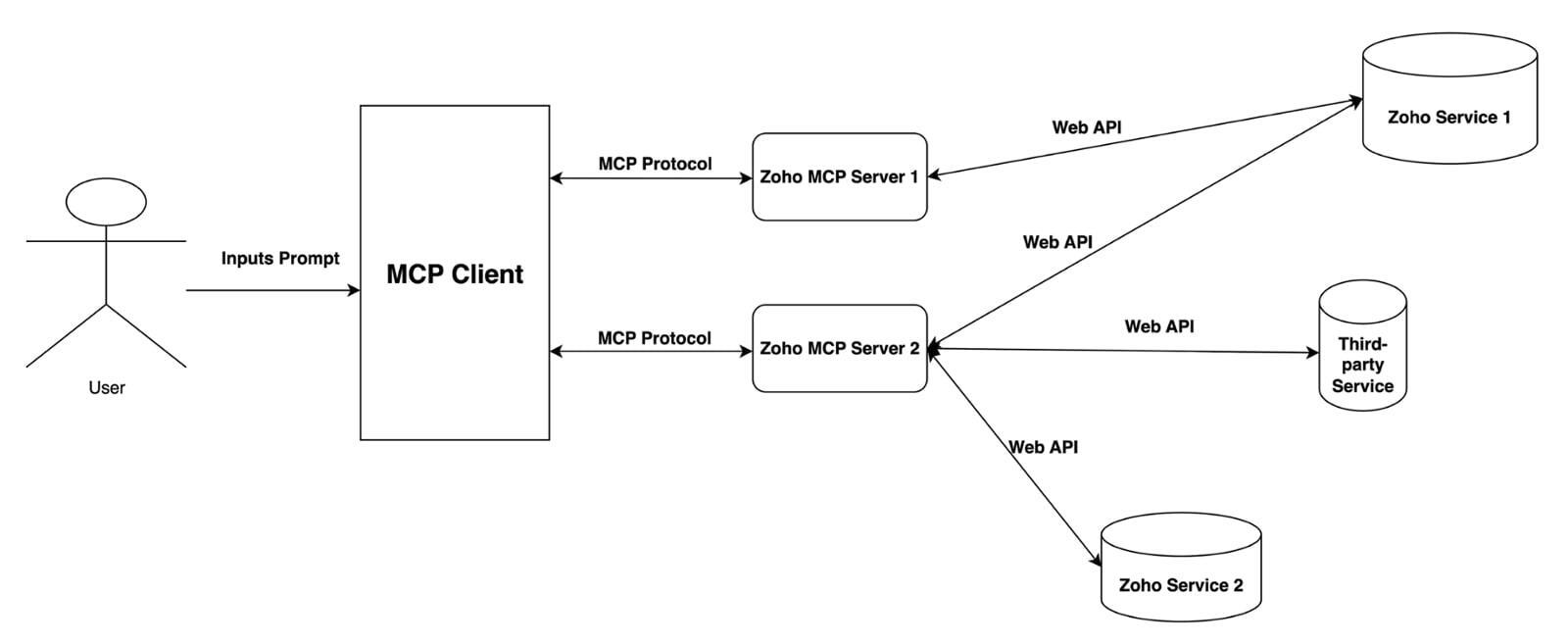Introduction
From a business perspective, it can be tough to keep up with all these new AI technologies. While I rely on technical experts to do the heavy lifting, I’ve always believed that system architecture, use cases, and implementation strategies should be driven by business leaders—not just technical teams.
If you feel the same way, keep reading. I’ll explain what Zoho MCP Server is, share why it matters for businesses, walk you through practical use cases, and give you some business guidance for adapting these tools.
What Is MCP Server (for Non-Technical Readers)?
Think of MCP as a “universal translator” between your business systems and AI.
Just like employees need the right reports and numbers to answer a question, AI also needs context—like data from Zoho CRM, Zoho Mail, or Zoho Books. MCP provides a standardized way for AI agents (like ChatGPT, Claude, or Zoho Zia Agents) to connect with these systems and automatically pull the right data when needed.
Imagine hiring a consultant. If you give them the right files and background info, they’ll give you solid advice. MCP ensures that your AI consultant (the agent) always has the right data—so the recommendations are accurate and relevant.

Image Credit: Zoho
Why Zoho MCP Matters for Businesses
The benefits go beyond just connecting tools:
- Efficiency: MCP provides a standardized protocol and pre-built solutions, so repetitive tasks can be automated reliably.
- Scalability: Whether you’re a solopreneur or an enterprise, MCP adapts as you grow. It’s built cloud-native, so it can handle bigger workloads without breaking.
- Lower Costs: By automating processes and reducing manual work, MCP saves you time and money.
What Makes Zoho’s MCP Server Different?
So far we’ve covered the basics. But why should businesses care about Zoho’s MCP Server specifically?But why should businesses care about Zoho’s MCP Server specifically
1. Deep Zoho Integration:
- Comes with built-in connections across 15+ Zoho apps (CRM, Desk, Mail, Cliq, Projects, Inventory, Books, and more on the way).
- Enables AI agents to perform real tasks—like creating leads, triaging tickets, or scheduling meetings—without custom coding
2. Schema-First Design
- Every integration has clear input/output rules, making it easier for both technical and non-technical teams to trust the results.
3. Built-In Playground
- Non-technical users can test and configure endpoints without writing code.
- Makes it easier to explore Zoho AI integrations quickly.
In other words, Zoho isn’t just giving you a bridge—it’s giving you a ready-to-deploy platform for AI-driven business automation.
Practical Use Cases of Zoho MCP
Here are a few ways I’ve seen Zoho MCP Server change workflows:
Use Case 1 - Purse unstructured data into Zoho
One of our clients receives orders through multiple channels, and many of them are unstructured. A large portion of their regular customers place draft orders directly by email.
During peak season, the client gets 25–30 orders per day. Previously, their team had to manually re-enter each order into Zoho CRM to kick off the fulfillment process. With each order taking about 5 minutes to process, this meant nearly 3 hours a day wasted on manual data entry.
To solve this, we ran a proof-of-concept (POC) using Zoho’s MCP Server and an AI agent. Here’s what we achieved:
- Email Parsing: The AI agent automatically scanned incoming emails, extracting order details such as customer info, items, and quantities.
- Validation: The system validated the items and prices against the client’s product list to reduce errors.
- Seamless Transfer to Zoho CRM: The order data was then pushed directly into Zoho CRM, creating a new order and updating the customer’s record in real time.
While this solution hasn’t yet been rolled out to production, the pilot project showed very promising results. The client is now looking at scaling this automation to save hundreds of hours during their busiest months while improving order accuracy and customer response times.
Use Case 2 – Customer Support & Helpdesk Automation
Support teams are moving toward AI-driven help desks.
Example: a customer submits a billing issue. Normally, an agent has to check CRM, Books, and Subscriptions manually. With MCP, an AI agent (like ChatGPT, Claude, or Zoho’s Zia Agent) instantly pulls the data, summarizes the journey, and suggests the fix.
The human agent simply reviews and approves—faster response times, fewer mistakes, and happier customers.
Use Case 3 – Recruitment Screening
Hiring often means going through hundreds of resumes.
With MCP, an AI agent could scan resumes in Zoho Recruit, score candidates, and even send interview scheduling emails. Recruiters focus only on top talent.
(Note: As of August 2025, Zoho Recruit isn’t yet MCP-ready, but it’s an exciting future direction.)
Use Case 4 – AI-Driven Lead Capture
Lead generation is always a challenge.
With Zoho MCP, an AI agent can capture leads through chat, email, SMS, or calls, enroll them into Zoho Campaigns, and assign scores automatically. Once a lead hits a threshold, it’s handed to a human SDR or account manager. That means sales teams focus only where it matters most.
Conclusion
For a while, I thought Zoho was behind in the AI race. But clearly, they’ve been working quietly in the background. With Zia LLM, Zia Agents, and now the Zoho MCP Server, they’re not just catching up—they’re positioning themselves as leaders in business-ready AI integration.
If you don’t have access yet, request it from Zoho. And if you’d like to explore how Zoho MCP can transform your sales, support, or recruitment processes, I’d love to help.
Book a free discovery call with me today to see how we can make Zoho AI tools work for your business.
I’m Mo, a Solution Architect, Zoho Partner, and CEO of Digital Era Hub.
